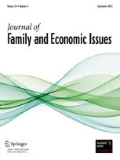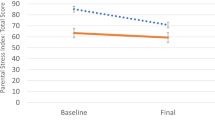Abstract
Eighty-nine African American mothers of preschoolers reported on their levels of family stress, attitudes about and use of specific disciplinary responses, and their expected outcomes for their children as a result of each type. Independently, teachers reported on the children’s manageability in the preschool classroom. Results indicated that mothers reported more negotiation than coercion. However, when mothers used coercion, they reportedly did so because they believed that it was the only way that they could get their children to behave, negotiation was negatively associated with maternal endorsement of traditional childrearing attitudes. On the other hand, mothers who experienced high levels of family stress tended to use privilege withdrawal as their disciplinary method of choice. Although family income was generally unrelated to the study variables, lower income and less educated mothers were less likely than other mothers to believe that spanking is associated with negative outcomes for children. Overall, these results support the idea that African American parents’ conceptions of discipline are influenced by individual family characteristics, such as stress, endorsement of traditional versus modern ideas of parenting, and expectations about their children’s responses to specific disciplinary techniques.
Similar content being viewed by others
References
Abidin, R. (1989). Parenting stress index-short form manual. Charlottesville, VA: Pediatrics Psychology Press.
Aiken, L. S., & West, S. G. (1991). Multiple regression: Testing and interpreting interactions. Newbury Park, CA: Sage.
Arditti, J., Burton, L., & Neeves-Botelho, S. (2010). Maternal distress and parenting in the context of cumulative disadvantage. Family Process, 49, 142–164.
Baumrind, D., Larzelere, R., & Cowan, P. (2002). Ordinary physical punishment: Is it harmful? Comment on Gershoff (2002). Psychological Bulletin, 128, 580–589.
Benjet, C., & Kazdin, A. E. (2003). Spanking children: Evidence and issues. Current Directions in Psychological Science, 12, 99–103.
Bluestone, C., & Tamis-LeMonda, C. S. (1999). Correlates of parenting styles in predominately working- and middle-class African American mothers. Journal of Marriage and the Family, 61, 881–893.
Bowman, S. W. (2011). Multigenerational interactions in Black middle class wealth and asset decision making. Journal of Family and Economic Issues, 32, 15–26.
Brody, G., & Flor, D. L. (1998). Maternal resources, parenting practices, and child competencies in rural, single-parent African American families. Child Development, 69, 803–816.
Bronfenbrenner, U. (1979). The ecology of human development: Experiments by nature and design. Cambridge, MA: Harvard Press.
Brown, D. R., & Keith, V. M. (2003). In and out of our right minds: The mental health of African American women. New York: Columbia Press.
Cain, D. S., & Combs-Orme, T. (2005). Family structure effects on parenting stress and practices in the African American family. Journal of Sociology and Social Welfare, 32, 19–40.
Caldwell, C. H., & Koski, L. R. (1997). Child rearing, social support, and perceptions of parental competence among African American mothers. In R. J. Taylor, J. S. Jackson, & L. M. Chatters (Eds.), Family life in Black America (pp. 185–200). Thousand Oaks, CA: Sage.
Christie-Mizell, C. A. (2006). The effects of traditional family and gender ideology on earnings: Race and gender difference. Journal of Family and Economic Issues, 27, 48–71.
Christie-Mizell, C. A., Pryor, E. M., & Grossman, E. R. B. (2008). Child depressive symptoms, spanking, and emotional support: Differences between African American and European American youth. Family Relations, 57, 335–350.
Davis, J., & Smith, T. W. (1986). 1986 General Social Survey, 1972–1986, Cumulative Codebook. Chicago: National Opinion Research Center.
Day, R. D., Peterson, G. W., & McCracken, C. (1998). Predicting spanking of younger and older children by mothers and fathers. Journal of Marriage and the Family, 60, 79–94.
Deater-Deckard, K., Dodge, K. A., Bates, J. E., & Pettit, G. S. (1996). Physical discipline among African American and European American mothers: Links to children’s externalizing behaviors. Developmental Psychology, 32, 1065–1072.
Deater-Deckard, K., Lansford, J. E., Dodge, K. A., Pettit, G. S., & Bates, J. E. (2003). The development of attitudes about physical punishment: An 8-year longitudinal study. Journal of Family Psychology, 17, 351–360.
Dennis, J. M., Parke, R. D., Coltrane, S., Blacher, J., & Borthwick-Duffy, S. A. (2003). Economic pressure, maternal depression, and child adjustment in Latino families: An exploratory study. Journal of Family and Economic Issues, 24, 183–202.
Dornbusch, S. M., Ritter, P. L., Leiderman, P. H., Roberts, D., & Fraleigh, M. (1987). The relation of parenting style to adolescent school performance. Child Development, 58, 1244–1257.
Durrett, M. E., O’Bryant, S., & Pennebaker, J. W. (1975). Childrearing reports of White, Black, and Mexican-American families. Developmental Psychology, 11, 871.
Fagan, J. (1998). Correlates of low-income African American and Puerto Rican fathers’ involvement with their children. Journal of Black Psychology, 24, 351–367.
Fletcher, A. C., Walls, J. K., Cook, E. C., Madison, K. J., & Bridges, T. H. (2010). Parenting style as a moderator of associations between maternal disciplinary strategies and child well-being. Journal of Family Issues, 29, 1724–1744.
Furr, R. M., & Bacharach, V. R. (2008). Psychometrics: An introduction. Thousand Oaks, CA: Sage.
Gershoff, E. T., Grogan-Kaylor, A., Lansford, J. E., Chang, L., Zelli, A., Deater-Deckard, K., et al. (2010). Parent discipline practices in an international sample: Associations with child behaviors and moderation by perceived normativeness. Child Development, 81, 487–502.
Giles-Sims, J., Straus, M. A., & Sugarman, D. B. (1995). Child, maternal, and family characteristics associated with spanking. Family Relations, 44, 170–176.
Graziano, A. M., Hamblen, J. L., & Plante, W. A. (1996). Substantive violence in child rearing in middle-class American families. Pediatrics, 98, 845–848.
Gross, D., Sambrook, A., & Fogg, L. (1999). Behavior problems among young children in low-income urban day care centers. Research in Nursing and Health, 22, 15–25.
Hofferth, S., Forry, W. D., & Peters, E. (2010). Child support, fathers-child contact, and parents’ involvement with non-residential fathers. Journal of Family and Economic Issues, 31, 14–32.
Holden, G. W., Coleman, S. M., & Schmidt, K. L. (1995). Maternal reports of spanking: Why 3-year-old children get spanked: Parent and child determinants as reported by college-educated mothers. Merrill-Palmer Quarterly, 41, 431–445.
Holden, G. W., & Zambarano, R. J. (1992). Passing the rod: Similarities between parents and their young children in orientations toward physical punishment. In I. E. Sigel, A. V. McGillicuddy-DeLisi, & J. J. Goodnow (Eds.), Parental belief systems: The psychological consequences for children (2nd ed., pp. 143–172). Hillsdale, NJ: Erlbaum.
Johnson, D. J., Jaeger, E., Randolph, S., Cauce, A. M., & Ward, J. (2003). Studying the effects of early child care experiences on the development of children of color in the United States: Toward a more inclusive research agenda. Child Development, 74, 1227–1244.
Julian, T. W., McKenry, P. C., & McKelvey, H. W. (1994). Cultural variations in parenting: Perceptions of Caucasian, African American, Hispanic, and Asian-American parents. Family Relations, 43, 30–37.
Keil, J. M., & Christie-Mizell, C. A. (2008). Beliefs, fertility, and earnings of African American, Hispanic, and non-Hispanic White mothers. Hispanic Journal of Behavioral Sciences, 30, 299–323.
Kelley, M. L., Sanchez-Hucles, J., & Walker, R. R. (1993). Correlates of disciplinary practices in working- to middle-class African-American mothers. Merrill-Palmer Quarterly, 39, 252–264.
Kircaali-Iftar, G. (2005). How do Turkish mothers discipline children? An analysis from a behavioral perspective. Child: Care, Health, and Development, 31, 193–201.
Kliewer, W., Cunningham, J., Diehl, R., Parrish, K., Walker, J. M., Atiyeh, C., et al. (2004). Violence exposure and adjustment in inner-city youth: Child and caregiver emotion regulation skill, caregiver-child relationship quality, and neighborhood cohesion as protective factors. Journal of Clinical Child and Adolescent Psychology, 33, 477–487.
Knight, G. P., & Hill, N. E. (1998). Measurement equivalence in research involving minority adolescents. In V. C. McLoyd & L. Stienberg (Eds.), Studying minority adolescents (pp. 183–210). Mahwah, NJ: Erlbaum.
Krenichyn, K., Saegart, S., & Evans, G. W. (2001). Parents as moderators of psychological and physiological correlates of inner-city children’s exposure to violence. Journal of Applied Developmental Psychology, 22, 581–602.
Lansford, et al. (2005). Physical discipline and children’s adjustment: Cultural normativeness as a moderator. Child Development, 76, 1234–1246.
Larzelere, R. E., Kuhn, B. R., & Johnson, B. (2004). The intervention selection bias: An underrecognized confound in intervention research. Psychological Bulletin, 130, 289–303.
Larzelere, R. E., Sather, P. R., Schneider, W. N., Larson, D. B., & Pike, P. L. (1998). Punishment enhances reasoning’s effectiveness as a disciplinary response to toddlers. Journal of Marriage and the Family, 60, 388–403.
McLoyd, V. C. (1990). The impact of economic hardship on black families and children: Psychological distress, parenting and socioemotional development. Child Development, 61, 311–346.
McLoyd, V. C., & Smith, J. (2002). Physical discipline and behavior problems in African American, European American, and Hispanic children: Emotional support as a moderator. Journal of Marriage and the Family, 64, 40–53.
McWayne, C. M., Owsianik, M., Green, L. E., & Fantuzzo, J. W. (2008). Parenting behaviors and preschool children’s social and emotional skills: A question of the consequential validity of traditional parenting constructs for low-income African Americans. Early Childhood Research Quarterly, 23, 173–192.
Mulvaney, M. K., Mebert, C. J., & Flint, J. (2007). Parental affect and childrearing beliefs uniquely predict mothers’ and fathers’ ratings of children’s behavior problems. Journal of Applied Developmental Psychology, 28, 445–457.
Murry, V. M., Harrell, A. W., Brody, G., Chen, Y., Simons, R., Black, A., et al. (2008). Long-term effects of stressors on relationship well-being and parenting among rural African American women. Family Relations, 57, 117–127.
Newsom, C., Favell, J. E., & Rincover, A. (1983). Side effects of punishment. In S. Axelrod & J. Apsche (Eds.), The effects of punishment on human behavior (pp. 285–316). New York: Academic Press.
Oburu, A. O., & Palmérus, K. (2005). Stress related factors among primary and part-time caregiving grandmothers of Kenyan children. International Journal of Aging and Human Development, 60, 273–282.
Palmérus, K. (1999). Self-reported discipline among Swedish parents of preschool children. Infant and Child Development, 8, 155–171.
Patillo-McCoy, M. (2000). Black picket fences: Privilege and peril among Black middle class. Chicago: University of Chicago Press.
Patterson, G. R., DeBaryshe, B. D., & Ramsey, E. (1989). A developmental perspective on antisocial behavior. American Psychologist, 44, 329–335.
Portes, P. R., Dunham, R. M., & Williams, S. (1986). Assessing child-rearing style in ecological settings: Its relation to culture, social class, early age intervention and scholastic achievement. Adolescence, 21, 723–735.
Ritchie, K., & Holden, G. W. (1998). Parenting stress in low income battered and community women: Effects on parenting behavior. Early Education & Development, 9, 97–112.
Scarr, S., & Ricciuti, A. (1987). The manageability scale. Unpublished Manuscript. University of Virginia.
Schaefer, E., & Edgerton, M. (1985). Parent and child correlates of parental modernity. In I. Sigel (Ed.), Parental belief systems. Hillsdale, NJ: Erlbaum.
Schieman, S., & Young, M. (2011). Economic hardship and family-to-work conflict: The importance of gender and work conditions. Journal of Family and Economic Issues, 32, 46–61.
Socolar, R. R., & Stein, R. E. (1996). Maternal discipline of young children: Context, belief, and practice. Developmental and Behavioral Pediatrics, 17, 1–8.
Spera, C. (2005). A review of the relationship among parenting practices, parenting styles, and adolescent school achievement. Educational Psychology Review, 17, 125–145.
Ulbrich, P., Warheit, G., & Zimmerman, R. (1989). Race, socioeconomic status, and psychological distress: An examination of differential vulnerability. Journal of Health and Social Behavior, 30, 131–146.
Vittrup, B., Holden, G., & Buck, J. (2006). Attitudes predict the use of physical punishment: A prospective study of the emergence of disciplinary practices. Pediatrics, 117, 2055–2064.
Walsh, W. (2002). Spankers and nonspankers: Where they get their information on spanking. Family Relations, 51, 81–88.
Wilkinson, D. (1987). Ethnicity. In S. Steinmetz & M. B. Sussman (Eds.), Handbook of marriage and the family (pp. 345–405). New York: Plenum.
Willis, W. (1992). Families with African American roots. In E. W. Lynch & M. J. Hanson (Eds.), A guide for working for working with young children and their families (pp. 121–150). Baltimore: Paul H. Brookes.
Author information
Authors and Affiliations
Corresponding author
Rights and permissions
About this article
Cite this article
Greene, K., Garner, P.W. African American Mothers’ Disciplinary Responses: Associations with Family Background Characteristics, Maternal Childrearing Attitudes, and Child Manageability. J Fam Econ Iss 33, 400–409 (2012). https://doi.org/10.1007/s10834-012-9286-3
Published:
Issue Date:
DOI: https://doi.org/10.1007/s10834-012-9286-3




